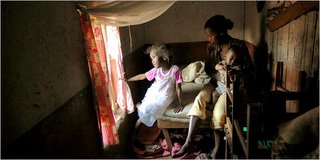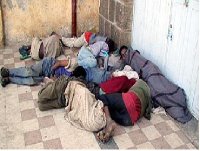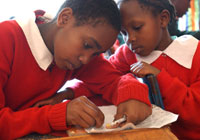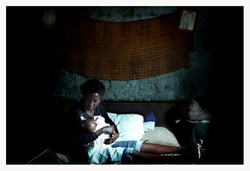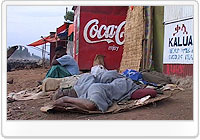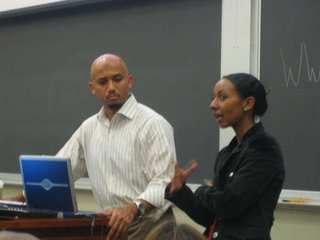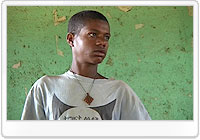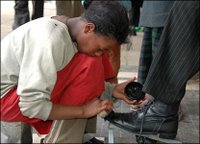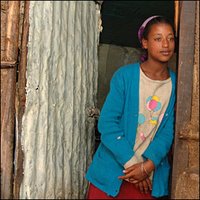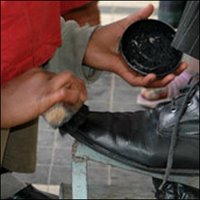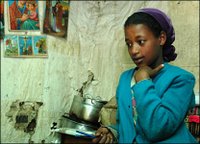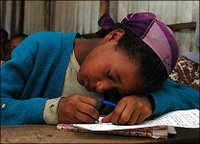
ZIMBABWE: Sex work thrives as girls struggle to survive
Via: IRIN
Photo: IRIN
Dressed in a tiny white skirt and a top, Linda, 16, (not her real name) struts into a nightclub in Madlambuzi, a sprawling rural settlement in Zimbabwe's Matabeleland South Province. Swinging to the deafening music, she scans the room for potential customers.
She joins a group of visibly drunk girls with pints of clear beer in their hands. Sex work is a last resort of girls desperate to make a living in this poverty-stricken village, or just to "get money to feed our families," Linda told IRIN.
"I was deported as an illegal emigrant from Botswana in December last year, where I used to work as a maid. I have no means of getting money to feed myself and my little child. This is why I am here," she said.
"My parents died two years ago, and I am the one responsible to fend for my two siblings and my only child. They look forward to me to bring food home. There are no jobs here, [and] food is very expensive," she added.
Desperate times
Gordon Chavhunduka, sociologist and political commentator, said Zimbabwe's "social fabric is fast collapsing, just the way the economy is. It's sad that people, especially the vulnerable ones - let alone young girls - would do terrible things just to survive in this economy. It's a sad story."
Linda has many difficulties to contend with besides soaring food prices and the rocketing inflation that has sent the economy into a tailspin, but worst, she feels, is facing criticism from her neighbors and relatives for selling her body.
According to village elders, sex work has been spreading rapidly in rural Matabeleland, especially where there are drinking spots or nightclubs. "These girls are a disgrace. We know survival is not easy, especially considering that commodities are expensive in shops and the there are no jobs, both here [countryside] and in towns, but selling their bodies is wrong," said Methuseli Dumani, a village elder. "We have tried talking to some of them to abandon their evil deeds but they would not listen. Each time the sun sets, you see them trickling in [the club] and start soliciting. We don't know how they can be stopped, at least for the preservation of our culture, which disapproves of prostitution," he added.
Linda and her colleagues know they are seen as immoral people, but say they have no choice. "I know what I am doing is wrong - it is even forbidden in the Bible - but there is no other means through which I can make a living. If I don't go out and sell my body, then my family will starve. Relatives and neighbours say I am a disgrace, but when I go to them and ask for maizemeal or money to help the family, they just look aside; yet they love to be critical."
After a while, Linda gets a "customer", a bald-headed man old enough to be her father, and disappears with him. 'Anita', another sex worker, said the poverty ravaging Matabeleland often forced girls as young as 13 to sell their bodies.
"Save for those who have breadwinners in South Africa and Botswana, many families here have no one looking after them at all. Many of us dropped out of school because our parents could not afford the school fees," she said.
Despite the dangers
Anita is adamant that she understands the dangers of sex work. "Everyone knows there is AIDS; it has actually killed a lot of people here, and some are even ill right now. I am personally afraid of the disease and I always insist on the use of condoms," she said. "For an all-night session, I charge something like Z$200,000 [US$8 at the informal market rate], and half that amount for a short-time session, which normally lasts for only two hours," Anita explained. "Our customers are normally truck drivers who deliver beer from Bulawayo, and those who go or come from Botswana to deliver or collect some goods."
An official of the Matabeleland AIDS Council said a recent survey in southern Zimbabwe had revealed that rural Matabeleland was worst affected by the AIDS pandemic, mainly because of its proximity to South Africa and Botswana. According to 2005 UN estimates, HIV prevalence among people aged 15-49 was 18.8 percent in South Africa and 24.1 percent in Botswana, with Zimbabwe estimated at 20.1 percent.
"Many people in this province work in Botswana and South Africa. Often it's a single partner of the family, say a husband or a wife, and because they stay away from their partner for long, they end up engaging in extramarital relationships, which have the potential of spreading the virus," the official told IRIN.
"Prostitution is another cause [of spreading HIV infection], and it is sad that we are seeing it rearing its head in rural areas," he said. "It just shows how desperate people are."
Photo: IRIN
Dressed in a tiny white skirt and a top, Linda, 16, (not her real name) struts into a nightclub in Madlambuzi, a sprawling rural settlement in Zimbabwe's Matabeleland South Province. Swinging to the deafening music, she scans the room for potential customers.
She joins a group of visibly drunk girls with pints of clear beer in their hands. Sex work is a last resort of girls desperate to make a living in this poverty-stricken village, or just to "get money to feed our families," Linda told IRIN.
"I was deported as an illegal emigrant from Botswana in December last year, where I used to work as a maid. I have no means of getting money to feed myself and my little child. This is why I am here," she said.
"My parents died two years ago, and I am the one responsible to fend for my two siblings and my only child. They look forward to me to bring food home. There are no jobs here, [and] food is very expensive," she added.
Desperate times
Gordon Chavhunduka, sociologist and political commentator, said Zimbabwe's "social fabric is fast collapsing, just the way the economy is. It's sad that people, especially the vulnerable ones - let alone young girls - would do terrible things just to survive in this economy. It's a sad story."
Linda has many difficulties to contend with besides soaring food prices and the rocketing inflation that has sent the economy into a tailspin, but worst, she feels, is facing criticism from her neighbors and relatives for selling her body.
According to village elders, sex work has been spreading rapidly in rural Matabeleland, especially where there are drinking spots or nightclubs. "These girls are a disgrace. We know survival is not easy, especially considering that commodities are expensive in shops and the there are no jobs, both here [countryside] and in towns, but selling their bodies is wrong," said Methuseli Dumani, a village elder. "We have tried talking to some of them to abandon their evil deeds but they would not listen. Each time the sun sets, you see them trickling in [the club] and start soliciting. We don't know how they can be stopped, at least for the preservation of our culture, which disapproves of prostitution," he added.
Linda and her colleagues know they are seen as immoral people, but say they have no choice. "I know what I am doing is wrong - it is even forbidden in the Bible - but there is no other means through which I can make a living. If I don't go out and sell my body, then my family will starve. Relatives and neighbours say I am a disgrace, but when I go to them and ask for maizemeal or money to help the family, they just look aside; yet they love to be critical."
After a while, Linda gets a "customer", a bald-headed man old enough to be her father, and disappears with him. 'Anita', another sex worker, said the poverty ravaging Matabeleland often forced girls as young as 13 to sell their bodies.
"Save for those who have breadwinners in South Africa and Botswana, many families here have no one looking after them at all. Many of us dropped out of school because our parents could not afford the school fees," she said.
Despite the dangers
Anita is adamant that she understands the dangers of sex work. "Everyone knows there is AIDS; it has actually killed a lot of people here, and some are even ill right now. I am personally afraid of the disease and I always insist on the use of condoms," she said. "For an all-night session, I charge something like Z$200,000 [US$8 at the informal market rate], and half that amount for a short-time session, which normally lasts for only two hours," Anita explained. "Our customers are normally truck drivers who deliver beer from Bulawayo, and those who go or come from Botswana to deliver or collect some goods."
An official of the Matabeleland AIDS Council said a recent survey in southern Zimbabwe had revealed that rural Matabeleland was worst affected by the AIDS pandemic, mainly because of its proximity to South Africa and Botswana. According to 2005 UN estimates, HIV prevalence among people aged 15-49 was 18.8 percent in South Africa and 24.1 percent in Botswana, with Zimbabwe estimated at 20.1 percent.
"Many people in this province work in Botswana and South Africa. Often it's a single partner of the family, say a husband or a wife, and because they stay away from their partner for long, they end up engaging in extramarital relationships, which have the potential of spreading the virus," the official told IRIN.
"Prostitution is another cause [of spreading HIV infection], and it is sad that we are seeing it rearing its head in rural areas," he said. "It just shows how desperate people are."























